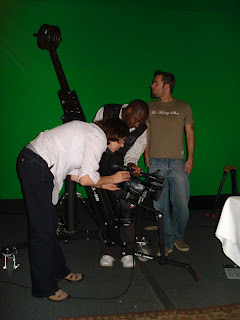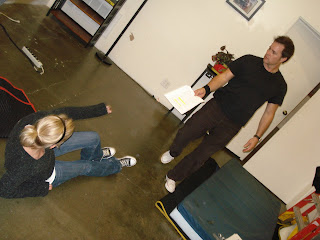
Somebody in my crew posted this on the door to the stage where I was shooting... obviously it's film school not grammar school.











 What it do? What it do? I finally got to do what I came out here to do. Make a movie. In between prepping for my shoot, I crewed on three of my classmates films. Anne, Ephantus, & Nitin. I did sound for two and was DP for another. DP is Director of Photography. Sound is okay but kind of boring after a while. Basically with sound you stand off to the side of the actors and hold a pole with a microphone attached to it. Always wearing headphones you let the director know if you captured sound or any other unwanted noises during a take. It's super easy to zone out so I kept reminding myself to stay in the present. DP is another story altogether. You are the camera man all day and it is incredibly collaborative with the Director. You are always communicating his needs/wants and your response. It's your job then to let the actors know when they are in frame and what you need from lighting on the set. I had a blast being the DP and it was a great learning experience. I definitely need to train my eye for capturing a shot. Where's the best place to set the camera, should you move the camera during a shoot, what angle should you use, etcetera, etcetera??? I had a blast running sound as well. Hell, it was just cool to be around a movie being made.
What it do? What it do? I finally got to do what I came out here to do. Make a movie. In between prepping for my shoot, I crewed on three of my classmates films. Anne, Ephantus, & Nitin. I did sound for two and was DP for another. DP is Director of Photography. Sound is okay but kind of boring after a while. Basically with sound you stand off to the side of the actors and hold a pole with a microphone attached to it. Always wearing headphones you let the director know if you captured sound or any other unwanted noises during a take. It's super easy to zone out so I kept reminding myself to stay in the present. DP is another story altogether. You are the camera man all day and it is incredibly collaborative with the Director. You are always communicating his needs/wants and your response. It's your job then to let the actors know when they are in frame and what you need from lighting on the set. I had a blast being the DP and it was a great learning experience. I definitely need to train my eye for capturing a shot. Where's the best place to set the camera, should you move the camera during a shoot, what angle should you use, etcetera, etcetera??? I had a blast running sound as well. Hell, it was just cool to be around a movie being made. 

 A few weeks into school we were informed that Fog City Pictures, the film production company associated with SFSDF, was having their world premiere of their latest film at the Mill Valley Film Festival and the students were invited to the screening, Q&A, and after-party. The movie is called Around June and was written and directed by James Savoca who is one of my instructors out at school. The movie stars Samaire Armstrong, Oscar Guerrero, Jon Gries, and Brad William Henke. There is a (really poor quality) picture above of the Q&A, from L to R: Brad William Henke, Jon Gries, Jeremiah Bimbaum (producer & co-founder of SFSDF), James Savoca, & a staff member from MVFF. It was both cool and surreal to be at a premiere and see and speak with the cast and crew of the film. The premiere was sold out and seemed to be a success for Fog City! It was mos def. sweet to meet the guy who played both Lazlo (thanks for the movie trivia answer Pat!) in Real Genius and Uncle Rico in Napoleon Dynamite...
A few weeks into school we were informed that Fog City Pictures, the film production company associated with SFSDF, was having their world premiere of their latest film at the Mill Valley Film Festival and the students were invited to the screening, Q&A, and after-party. The movie is called Around June and was written and directed by James Savoca who is one of my instructors out at school. The movie stars Samaire Armstrong, Oscar Guerrero, Jon Gries, and Brad William Henke. There is a (really poor quality) picture above of the Q&A, from L to R: Brad William Henke, Jon Gries, Jeremiah Bimbaum (producer & co-founder of SFSDF), James Savoca, & a staff member from MVFF. It was both cool and surreal to be at a premiere and see and speak with the cast and crew of the film. The premiere was sold out and seemed to be a success for Fog City! It was mos def. sweet to meet the guy who played both Lazlo (thanks for the movie trivia answer Pat!) in Real Genius and Uncle Rico in Napoleon Dynamite...



